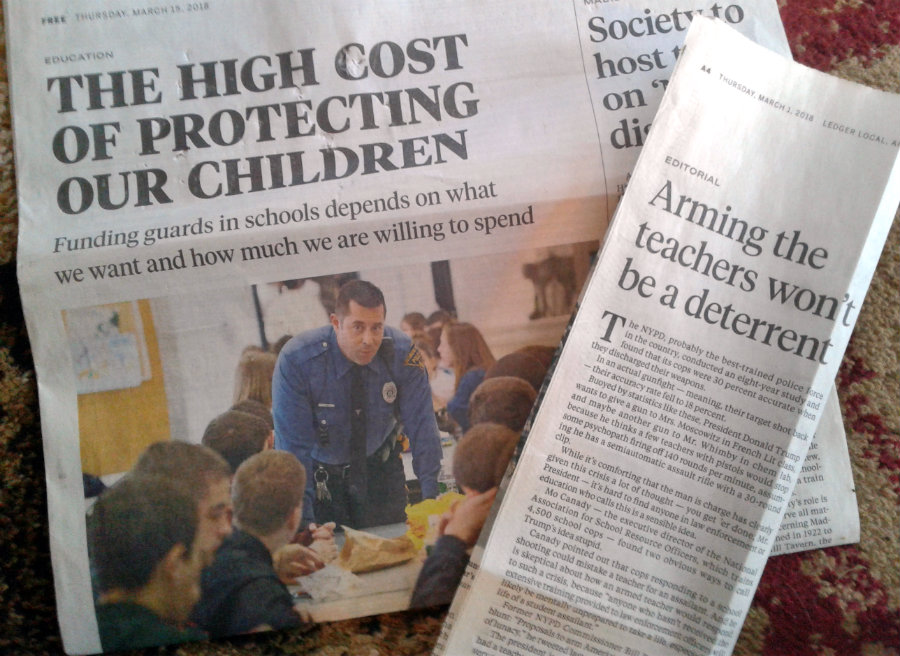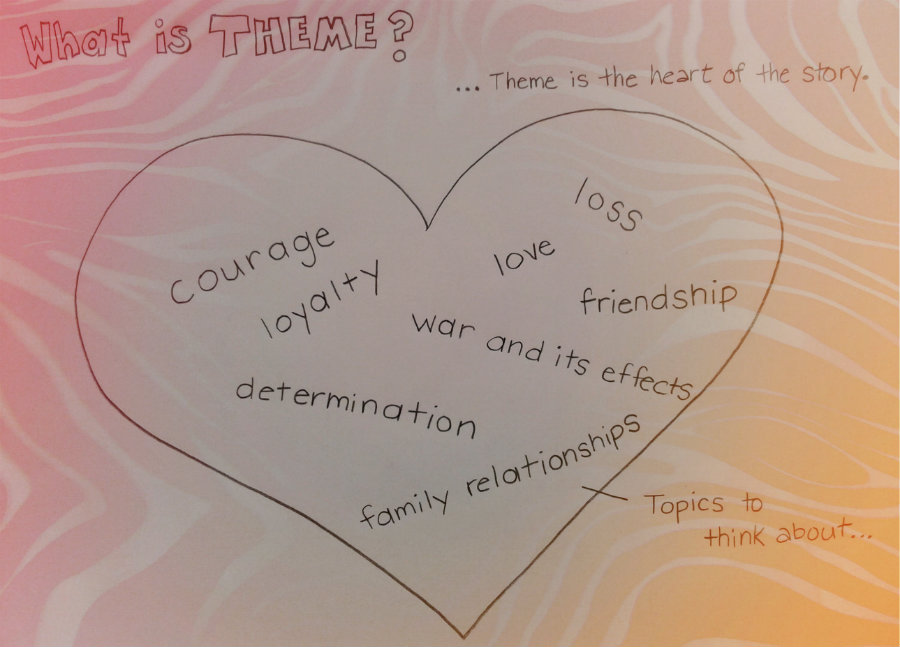Seeing School Tragedy through a Pax Lens
A MiddleWeb Blog
 As I sit down to begin this article, I can honestly say that I’m not sure where it is going. Admittedly, this happens a lot to me as a writer, but tonight is different.
As I sit down to begin this article, I can honestly say that I’m not sure where it is going. Admittedly, this happens a lot to me as a writer, but tonight is different.
I don’t have writer’s block tonight. It’s more like writer’s ricochet…ugly thoughts are flying around, attacking my peace of mind. The setting in my head is pretty dark at the moment.
I wanted to focus on our current read aloud, Pax, by Sara Pennypacker. Pax is a beautiful story, one that was given to us two years ago, when last year’s class participated for the first time ever in Pernille Ripp’s inspiring Global Read Aloud project.
This year in 4T, we are reading it as we explore theme, symbolism, and the art of the literary essay. I love sharing books with my kids, the stories that touch my life. I love meeting Peter again, and Vola, and Bristle, and I see these same characters touch the lives of my readers as they meet them too, and we become vested in the characters’ future.
Sharing stories connects us
Sharing stories helps us heal from our collective wounds. The irony in the meaning in Pennypacker’s title does not escape me, at the moment. “Pax” is defined as a period in history marked by the absence of major wars, usually imposed by a predominant nation, or as “the kiss of peace.” My mind is anything but peaceful at the moment. Too many frightening things are happening in the world, interrupting my train of thought. There’s a small war going on inside my head.
Pax is fiction. The topics on my mind are real. And their effects are the only things that seem to be clear in my mind right now. Kids are shooting kids. There’s talk about teachers carrying guns. Many politicians and special interest groups are scrambling to find their own solutions to this unacceptable fact.

It didn’t happen here, but it certainly had immeasurable impact here.
The setting at school has changed. Our doors are always closed…and they are always locked.
I don’t know how it will all play out. Maybe our current read aloud is a good place to start after all. Pennypacker chose to keep the setting of her story undefined. We never find out where it is happening. Pax takes place during a war, but no specific war or country is ever mentioned.
This purposeful choice meets us on Pennypacker’s first page, where she begins with a quote:
Just because it isn’t happening here, doesn’t mean it isn’t happening.
The fact that it is happening at all saddens me deeply. And just because it isn’t happening here, doesn’t mean we’re not responsible for what happens next.
Pax is a story of shared common pain…and of being there for each other through that pain.
Perhaps this is the only place we can begin. Because of the tragic and incomprehensible things that keep happening in our schools and in our communities, we are all affected. How could we not be?
Our shared grief
The changes at our school, our new setting, can be seen as tragic as well. None of us here has had to experience the direct pain and suffering of the victims in the school shootings. Their pain and loss can’t be described with words. It can only be felt through the compassion and connection we have, with our shared grief.
It feels like we are in the midst of a War on Violence. Is it me, or does that phrase sound a bit off?
Here’s what I do know. Police officers have become a daily part of our school life. They patrol the halls now. Safety drills are no longer sprinkled with a slight sense of complacency. Just because it isn’t happening here, doesn’t mean it couldn’t.
(Here’s the part of the story where the power suddenly went out in the house, dear Reader, and I find myself sitting in the dark, computer screen glowing.)
New Jersey, along with the rest of the east coast, is getting hit pretty hard by a snow storm with high winds. Shortly after the house went dark, there was a thunderous crash from somewhere close by. I used my critical thinking skills to infer that one of the large trees on our street had succumbed to the storm and quickly accepted the fact that power would not be returning any time soon. I am going to shut down the computer, along with my bouncing brain waves, conserve my battery, and put today to bed.
Days later: Still out of power at home
Temperatures dropped well below freezing that night. We were not alone. Neighboring towns and streets just around the corner were also slammed by the storm. The town next to us had close to seventy percent of its homes lose power. Yet, the town on the other side did fairly well, as far as power outages go.

Photo by Walfred Cabrera on Reshot
Three days later, just over a month since that life-changing day at a thriving Florida high school, I find myself huddled in front of my fireplace, trying to finish this piece and waiting for the tree guys to remove the tree that fell on the house next door.
Just because it isn’t happening in my living room, doesn’t mean it isn’t happening. It happened at my neighbor’s house.
Just because it isn’t happening here, doesn’t mean it isn’t happening.
Pax takes place nowhere and everywhere. Pennypacker’s prose describes her setting beautifully. She is an artist of words. She takes us into the sadness of war, its effects on the people we love, and our ability to overcome painful wounds and begin anew.
Pax is about giving people you don’t think you have anything in common with a chance, people who perhaps think differently than you, people who are also bringing old injuries into a new experience, in search of hope again. When the power went out, my focus certainly changed. I found myself searching too. I was searching for warmth and power.
A Trump supporter ended up being my saving grace during the power outage…five full days. Meals were provided, laughter was shared and, eventually, political opinions were aired. Let’s suffice it to say that our political views would have been ripe for a lesson on differing outlooks.
But as I sat in warmth, with a full belly of food, most of the angry retorts to these viewpoints (and my reactions to news being reported on the electrically and politically charged television screen) stayed in my head.
This was not easy. I have lots of strong opinions. Perhaps there is a theme or a wisdom hidden somewhere inside this new-found restraint. Pointing fingers and laying blame serves no effective purpose. I know this. War destroys whatever setting it is invited into.
So what themes do we teach our future leaders?
Real-life tragedy, a book called Pax, and a power outage have given 4T a few themes to mull over as our story continues. So far, my group of nine and ten year olds has identified courage, love, loss, war and its effects, loyalty, determination, family relationships, and friendship as themes within Pennypacker’s story.
I think we’ve made a good beginning.
So how do we continue to help our learners apply fiction to real life challenges? Maybe by sharing our own experiences and helping them see that, Just because it isn’t happening here, doesn’t mean it isn’t happening. It is happening. But they can be a part of the solution.
Resources
Pax thematic exploration ~ Still learning how to best harness the power of this amazing resource developed by another dedicated educator
“Movie” Trailer? ~ The movie is in the making, evidently…Yay!
An interview with Sara Pennypacker by Kiera Parrott
Stories of school safety conversations in New Jersey here and here




































What a great piece from a fellow teacher and a good friend. I always learn something news from your blogs. The message in Pax was poignant and timely. Thanks for all that you do MT!